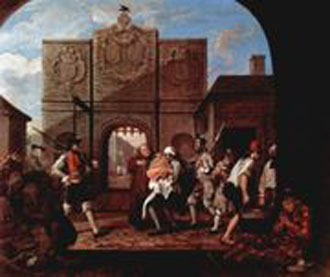|
什么是歡樂英格蘭?
[ 2007-05-16 15:54 ]
 The term Merry England, or in more jocular, archaizing spelling Merrie England, refers to a idealized, idyllic, and pastoral way of life that the inhabitants of England allegedly enjoyed at some poorly-defined point between the Middle Ages and the onset of the Industrial Revolution. It is a utopian and not completely consistent vision: a revisited England, "the thatched cottage, the country inn, the cup of tea, and Sunday roast". It may be treated both as a product of the sentimental nostalgic imagination, and an ideological construct. The term Merry England, or in more jocular, archaizing spelling Merrie England, refers to a idealized, idyllic, and pastoral way of life that the inhabitants of England allegedly enjoyed at some poorly-defined point between the Middle Ages and the onset of the Industrial Revolution. It is a utopian and not completely consistent vision: a revisited England, "the thatched cottage, the country inn, the cup of tea, and Sunday roast". It may be treated both as a product of the sentimental nostalgic imagination, and an ideological construct.
The concept of a Merry England may have originated in the Middle Ages, describing a utopian state of life that peasants aspired to lead (see Cockaigne). Peasant revolts, such as those led by Wat Tyler and Jack Straw invoked a visionary idea that was also egalitarian. Tyler's rebels wished to throw off the "Norman yoke" and return to a perceived time where the Saxons ruled in equality and freedom. The main arguments of Tyler's rebels were that there was no basis for aristocratic rule in the Bible, and that the plague had demonstrated by its indiscriminate nature that all people were equal under God. Thus they adopted the rhetoric of Norman vs. Saxon conflict as part of a much wider ideology. This idealized view of society was in any case an unrealistic version of life in the fourteenth and fifteenth centuries, although there was a period after the Black Death when labour shortages meant that agricultural workers were in stronger positions, and though the good harvests and gentle inflation of the thirteenth century had eased fixed burdens owed to landlords by smallholders.
At various times since the Middle Ages, authors, propagandists, romanticists, poets and others have revived or co-opted the term. The celebrated Hogarth engraving illustrating the patriotic song "The Roast Beef of Old England" is as anti-French as it is patriotic. In Die Lage der arbeitenden Klasse in England (1844: translated as The Condition of the Working Class in England), Friedrich Engels wrote sarcastically of Young England (a ginger-group of young aristocrats hostile to the new industrial order) that they hoped to restore "the old 'merry England' with its brilliant features and its romantic feudalism. This object is of course unattainable and ridiculous ..." The phrase "merry England" appears in English in the German text.
點擊查看本頻道更多精彩內容
|